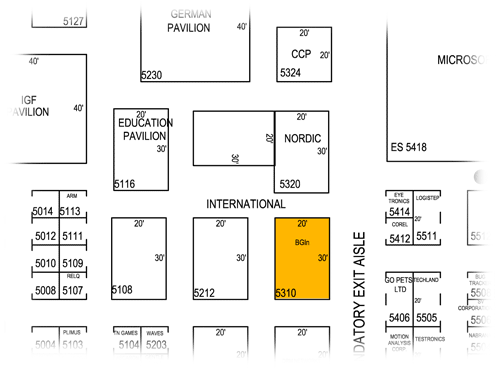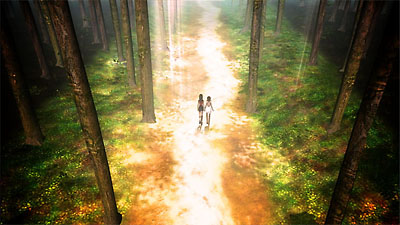The high definition version of the GDC 2007 teaser for The Path is now available for download.
Author: Michael
Losing Control versus Freedom
Traveling and playing games are oddly similar…
It is often assumed that interactive media are so powerful because they offer the user control over the experience, a type and/or level of control that they cannot get in real life. But I’ve been thinking that this may not be correct. Maybe it’s the opposite. Maybe computer games are so appealing because they force us to give up control, because they put us in a situation over which we cannot exercise the control we’re used to in real life. As such, it is the lack of control that gives us a feeling of freedom, not an abundance of choices and possibilities.
Games force us to live in an artificial situation and to control it in appropriate ways. This is how we can murder and slaughter in a game without feeling guilty. It’s a bit like being in the army, I guess. Once you sign up, you’re basically not responsible for what you do anymore. You’re “just following orders”. And this giving up of control over your own life, over your own decisions, gives you access to a range of actions that you otherwise could not perform. And to a form of joy that is otherwise out of reach.
Surrendering to a situation that is beyond your control is a form of escapism. Escapism insulates you from reality and has, as such, limited artistically expressive potential. Perhaps art happens when there is a moment of control that transcends the illusion: when suddenly the experience connects to something in our own life, teaches you something about yourself.
If games are about yielding rather than exercising control, having a wide range of actions (or “verbs”) available to the player is not as important as presenting a good selection of actions that are relevant to the situation. This selection is a powerful narrative tool. If, for instance, rather than adding ten more weapons for your space marine to control, you give him the ability to pick a flower, you suddenly have enriched your narrative palette tremendously, while in fact reducing the amount of development work.
The Effect of Stories
Listening to Warren Spector’s plea for more story in games at the Game Developers Conference, I couldn’t help but think of The Endless Forest, and by extension of our plans for The Path. Somehow I feel that we have solved, or on the verge of solving, the issues that Mr. Spector, and the work of Michael Mateas and Andrew Stern quoted in his presentation, deal with. These thoughts are a bit awkward because what we do is nowhere near the technical and theoretical sophistication of what these gentlemen are dealing wih. And also because I can imagine that it would be hard for them to think of The Endless Forest as a narrative game.
We have a very different approach. I’m all for diversity, so I wouldn’t want to claim that our approach offers the ultimate solution for implementing narrative in games. But perhaps what we do is something like the third or fourth way that Warren Spector seemed to be looking for. It that sense, it would be typical if our approach comes from an unexpected place.
In several sessions in the conference, I felt that the way most game developers think about their work is very different from how we think. They think like engineers, like problem solvers. They seem to define everything as a problem that needs a solution. While I think we, at Tale of Tales, look at this medium as an enormous opportunity.
The attempts at solving the problem of story telling in games thusfar seem to have been just that. To think of storytelling as a problem and then to try to solve it. Whereas I think our approach is a more playful one where we kneed and mould the potential of the medium and almost accidentally end up telling stories. Probably because our hands and minds are inspired by stories. And some of this inspiration slides into the end result.
This almost sounds like mysticism but I don’t it is that romantic at all. What we are going for is effect. We do not look at storytelling (or gameplay for that matter) as something from another medium that needs to be translated to a new medium. Instead we observe the effect that the stories from the past have on us and we try the recreate that effect. In our case this is a highly subjective method but, if desired, this method could be objectified (though I have serious doubts as to whether it is a good idea to try and make art through objective methods).
I will admit that we have a broad definition of what constitutes a story. Probably because we are only really interested in the emotional effect. We get a similar “narrative effect” from a painting as we do from a theater play or a musical composition. Rather than imitate the structure of music in interactive media in the hope to achieve the same effect, we look at the tools and techniques that interactive media offer us -the things that they are good at- and combine them in a way that generates the desired effect.
And this is how The Endless Forest ends up being a story. It generates a similar effect in the player as hearing a story or seeing a movie. The feeling of having lived through something combined with having learned something meaningful, a lesson that applies to one’s own life. One could argue that this is not sufficient to constitute a story. But, even though I don’t think of myself as a modernist, I can’t help but think how similar this sounds to the claim that jazz or pop music is not real music. I don’t know. If something achieves the same result as something else, I guess it doesn’t mean that it is equal. But at least it’s a good substitute. Does it mater if the pill is a placebo as long as it cures the disease? Perhaps the placebo even tastes better.
Be nice to this deer!
 This is the pictogram of the deer playing The Endless Forest at the Game Developers Conference in San Francisco. Be nice to it. It might feel a bit lost. 😉
This is the pictogram of the deer playing The Endless Forest at the Game Developers Conference in San Francisco. Be nice to it. It might feel a bit lost. 😉
The exhibition opens tomorrow.
The Path: new teaser & website
We have launched a new website for The Path (formerly known as 144) at the occasion of our participation in the Game Developers Conference next week in San Francisco.
The Path is a single player short horror game that we’re currently developing. Jarboe is making the music for it, together with Kris Force. Some of it can be heard in the teaser. And our long-time collaborator Laura Smith is animating our girls and “wolves”.
We are very excited to finally be able to show some of this work at last! The trailer is featuring just one of the 6 girls you will be able to play in game.
Still a lot of work to do. But launching a website feels like a mile stone. 
Let us know what you think!
Tale of Tales at GDC 2007
We will be visiting the Game Developers Conference in San Francisco from 5 to 9 March. It was a last minute decision. The Benelux Game Initative is offering us some space in their booth (5310 NH) where we’ll be showing The Endless Forest and the first teaser for our new project, The Path (formerly 144). It’s likely that we will mostly be roaming around, attending lectures and hanging out. So if you want to meet us, please email us, preferably in advance.

On March 8, Patrick Dugan will be presenting a poster session entitled “First-Generation Drama Engines”, featuring, amongst others, Drama Princess.
Vernanimalcula in the National Bank collection
Tale of Tales screensaver Vernanimalcula included in art collection of the National Bank of Belgium: free download!
Presenting The Path (144) in Vooruit

Tale of Tales talks about 144 on 13 Feb 2007, at 8 PM, at The Game Is Up! in Vooruit in Gent. More information here.
Article in Receiver Magazine
Tales of Tales article published in Vodaphone’s Receiver Magazine online “Games in spite of themselves”: here.
More funding for 144
Design Vlaanderen grants initial funding for 144.
